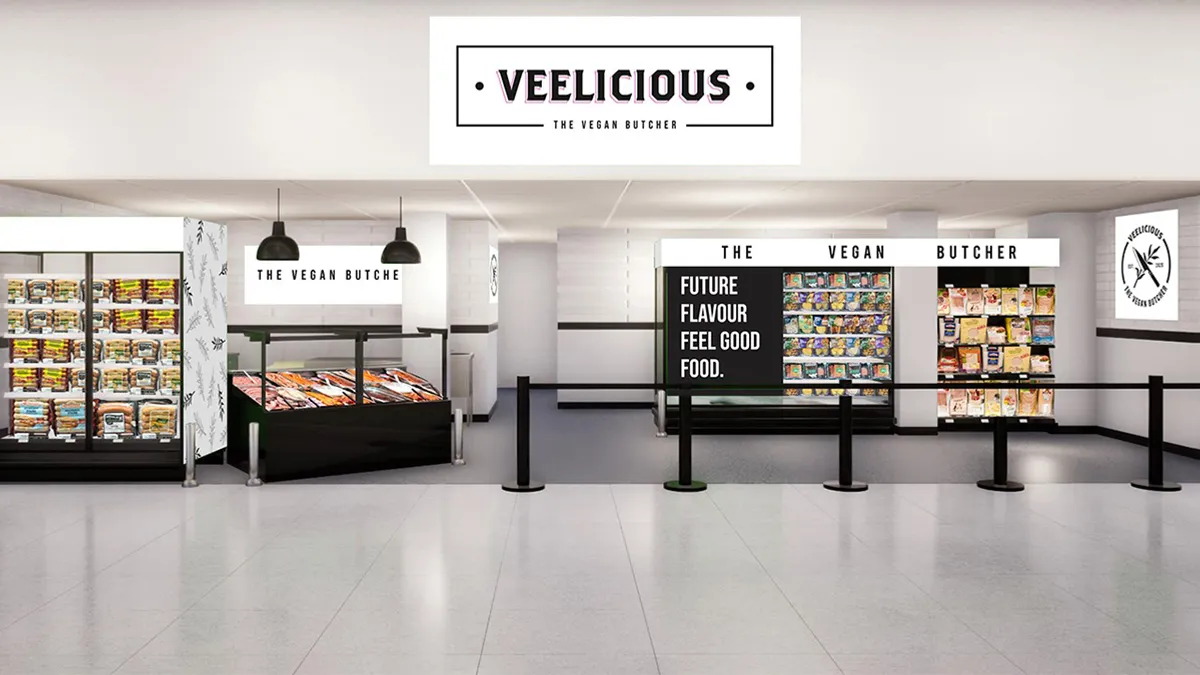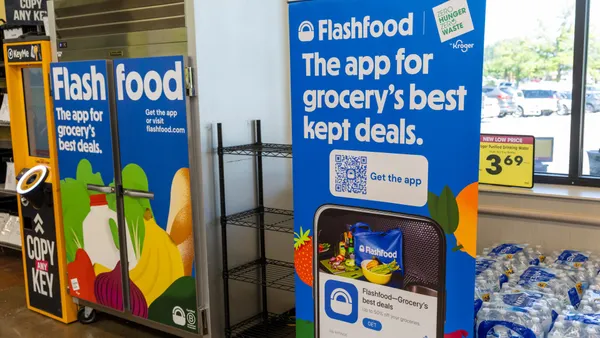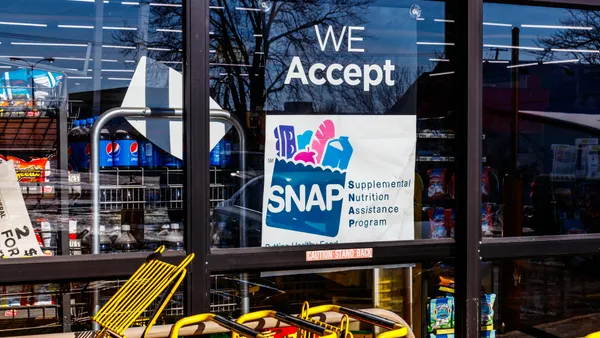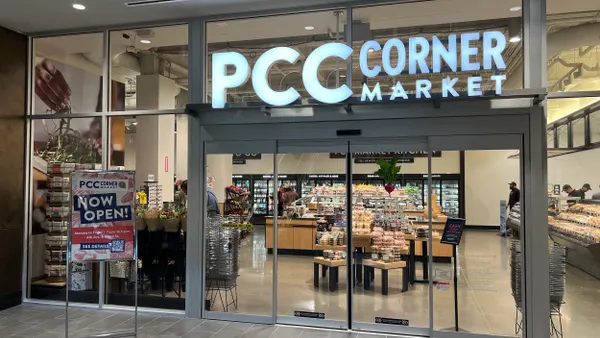Aisles Abroad is a monthly feature that examines notable grocery initiatives outside the U.S.
Just a few weeks away from the New Year, Asda decided it needed to try something new to harness the popularity of plant-based foods.
The British supermarket chain had initially approached Kbox Global, a startup that specializes in revamping commercial kitchen space, in December to talk about food delivery. But about 10 days into discussions, the grocer ran the idea for a vegan butcher counter by the London-based firm, said Salima Vellani, Kbox’s founder and CEO. The launch would coincide with Veganuary, a monthlong challenge in January for U.K. consumers to follow a vegan diet.
“The U.K. shuts down pretty much all December, and we're in the middle of a pandemic, and [we said,] ‘Are you serious?’ They’re like, ‘Yeah, we’re very serious.’” Vellani said.
The teams got to work and by early January, the grocer announced the six-month trial for the vegan butcher counter at its Watford store outside London. Called Veelicious, the pilot aims to save shoppers the scavenger hunt of finding plant-based items by consolidating them in one section.
While its branding indicates a focus on meat alternatives, Veelicious offers much more than that. There’s alternative seafood, snacks, dairy and more. The space includes refrigerated cases, a frozen section and a deli case with plant-based cheeses and meats.
We've had a fantastic first 5 days at Veelicious in Asda Watford with lots of great comments on the meat-free range, especially our mock meats! If you're in the area this weekend - be sure to stop by and chat with the team! pic.twitter.com/oosc9bcgCi
— Kbox Global (@KboxGlobal) January 15, 2021
Pulling off the quick turnaround — “We were literally given 48 hours to come up with the concept, the name and the brand,” Vellani said — was a notable feat for the companies. But they have closely analyzed the section in the weeks since it launched and decided on some changes they want to implement.
“A lot of what we originally put in, we're taking out. The price points were too high for the Asda customer. We want it to be affordable,” Vellani said in March.
Asda declined to comment for this story.
Vellani said that Asda and Kbox are investing more resources into finding new products and expanding the selection. Kbox has chefs and nutritionists testing new products like mock steaks and sausages, and has been paying special attention to product shelf life.
Plant-based food gives U.K. grocers an edge
Europe is seeing the rise of vegan-only services, and, in the U.K., plant-based eating is becoming mainstream, said Derya Guvenc, a retail analyst in the U.K. for Kantar.
“Flexitarians are a much larger group we see, [along with] older demographics because of health reasons, so it's not just a young hipster thing,” Guvenc said.
Plant-based eating also has cultural ties. For example, Ramadan is currently underway, which can prompt Muslims to seek alternative food, and many South Asian communities already follow plant-based diets, Guvenc said: “Vegetarianism and veganism — if we think it's just up and coming, we're thinking of a very limited demographic."
For Asda, which was recently acquired from Walmart by the Issa brothers and TDR Capital, increasing its plant-based offerings is important because direct competitors like Sainsbury’s and Tesco are already adding more options.
“I would say Asda is playing catch up,” Guvenc said.
Along with Veelicious, Asda also added in January more than 20 meat-free items to its Asda Plant Based label, which launched with 48 products at the start of 2020. Asda has projected that its vegan product sales would increase by 391% year-over-year in January after seeing online searches for “vegan” on its website bump up 175% year-over-over.
“I see the Watford trial, the single store trial, as Asda saying: ‘This is a space we want to claim,’” Guvenc said.
The Watford store is a prime spot for the pilot because it was seeing a surge of vegan sales and is in close proximity to some of the suppliers identified for the pilot, Vellani said.
As the trial period gets closer to its six-month mark, Kbox is working with Asda to determine if Veelicious will expand in its current form or if it will turn into a cafe or kitchen concept, Vellani said. “What Asda has an interest in doing is understanding what products are selling so that they could actually develop ranges around that in a much bigger way across stores,” Vellani said.
U.S. grocers growing plant-based offerings
With the Veelicious pilot underway, Kbox is turning its attention to the U.S. — a country where plant-based foods are quickly gaining in popularity — with the hopes of arriving in the fall.
The recent labeling of products as "plant-based" rather than "vegan" has allowed for wider adoption of plant-based foods among a variety of customers, from people who are curious to flexitarians and vegans, said Carol Spieckerman, president of retail consulting firm Spieckerman Retail.
From CPGs and meat and dairy companies jumping into plant-based alternatives to vegan-only restaurants and grocers popping up around the country, Spieckerman said the U.S. is poised for an explosion in plant-based products: "Things should only get bigger and better and cheaper.”
Roughly 19% of U.S. consumers are flexitarians, while nearly 6% are vegan and vegetarian, according to The Power of Meat report published in March. The report noted that one-third of the respondents claimed they want to cut back poultry and meat in their diets.
In recent years, grocers in the U.S. have ramped up their plant-based selections, from providing more shelf space to adding more national plant-based brands to rolling out their own private-label plant-based alternatives.
Now, U.S. grocers face the dilemma of how to merchandise plant-based offerings. “Given the size of assortment and some vegan products need freezers or chillers, they tend to sit with the respective categories,” Guvenc said, noting that shoppers are also used to navigating through the store for items.
Research published by Kroger and the Plant Based Foods Association last summer found that plant-based meat sold 23% better in stores when placed in the meat department. According to the Power of Meat, 64% of survey respondents in the U.S. are interested in having plant-based meat in the meat department.
But Asda's consolidated approach might pick up traction in the U.S. In a similar manner, The Giant Company’s new flagship store in Philadelphia is home to the mid-Atlantic grocery chain’s largest selection of plant-based foods, many of which are sold together in a dedicated section.
“As it goes from being a fringe category to becoming a full-blown, multi-category proposition, there is a logic to clustering those items together so that they're easy to find," Spieckerman said.
Companies behind the products are often driving the product placement, Spieckerman noted: “The plant-based companies have lobbied hard to get their products placed next to an alternative to their counterparts … And there's also been pushback from meat companies.”
She recommends that grocers carefully consider how they want to position plant-based food: Are they an alternative or a replacement? Does promotion center them as a lifestyle choice or for health reasons? Additionally, she sees promotional opportunities online for grocers through recommendations and product filters to drive the discovery process.
Ultimately, both concepts could work, Spieckerman said: “The best situation for a lot of these companies is to get double placement, and in some cases, that might be warranted to have them tucked in with their categorical counterparts, but also have them placed in special sections."












